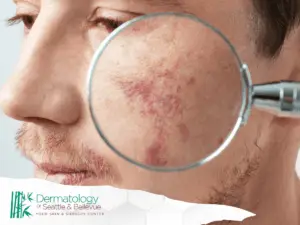Childhood eczema, or atopic dermatitis, is a common skin condition affecting many children worldwide. It causes dry, itchy, and inflamed skin, often appearing before age five.
Quick Summary
- Childhood eczema (atopic dermatitis) is common in young children and causes dry, itchy, inflamed skin; genetics and environmental factors may contribute.
- Identify and reduce triggers such as allergens, harsh soaps/detergents, stress, weather changes, and certain foods; tracking symptoms can help pinpoint patterns.
- Maintain a daily routine with lukewarm baths, gentle cleansing, and immediate use of thick, fragrance-free moisturizers; wet wrap therapy and coconut oil may add moisture and relief.
- Natural options like oatmeal baths, calendula, aloe vera, honey, shea butter, and possible probiotics or omega-3-rich foods may help, with monitoring for reactions.
- Seek medical care if symptoms persist, disrupt daily life, or show infection; treatments may include topical corticosteroids, calcineurin inhibitors, antihistamines, or light therapy, along with emotional support and reassurance.
Parents and caregivers face challenges in managing this condition. Finding gentle and effective treatments is crucial for soothing young skin.
Understanding eczema’s triggers and symptoms can help in developing a comprehensive care plan. This includes both natural remedies and medical treatments.
Natural eczema remedies, like oatmeal baths and coconut oil, offer relief without harsh chemicals. These options are often preferred by parents seeking safe solutions.
This article explores various childhood eczema treatments. It aims to provide parents with strategies to manage and soothe their child’s skin.
Understanding Childhood Eczema
Childhood eczema, affecting 10-20% of kids, is marked by skin irritation and itchiness. It often starts young, impacting daily life significantly.
The exact cause of eczema remains a mystery. However, genetic and environmental factors are often linked to its development. Triggers can worsen symptoms and require careful management.
Common eczema symptoms include:
- Red, inflamed skin patches
- Persistent itching
- Dry and scaly skin
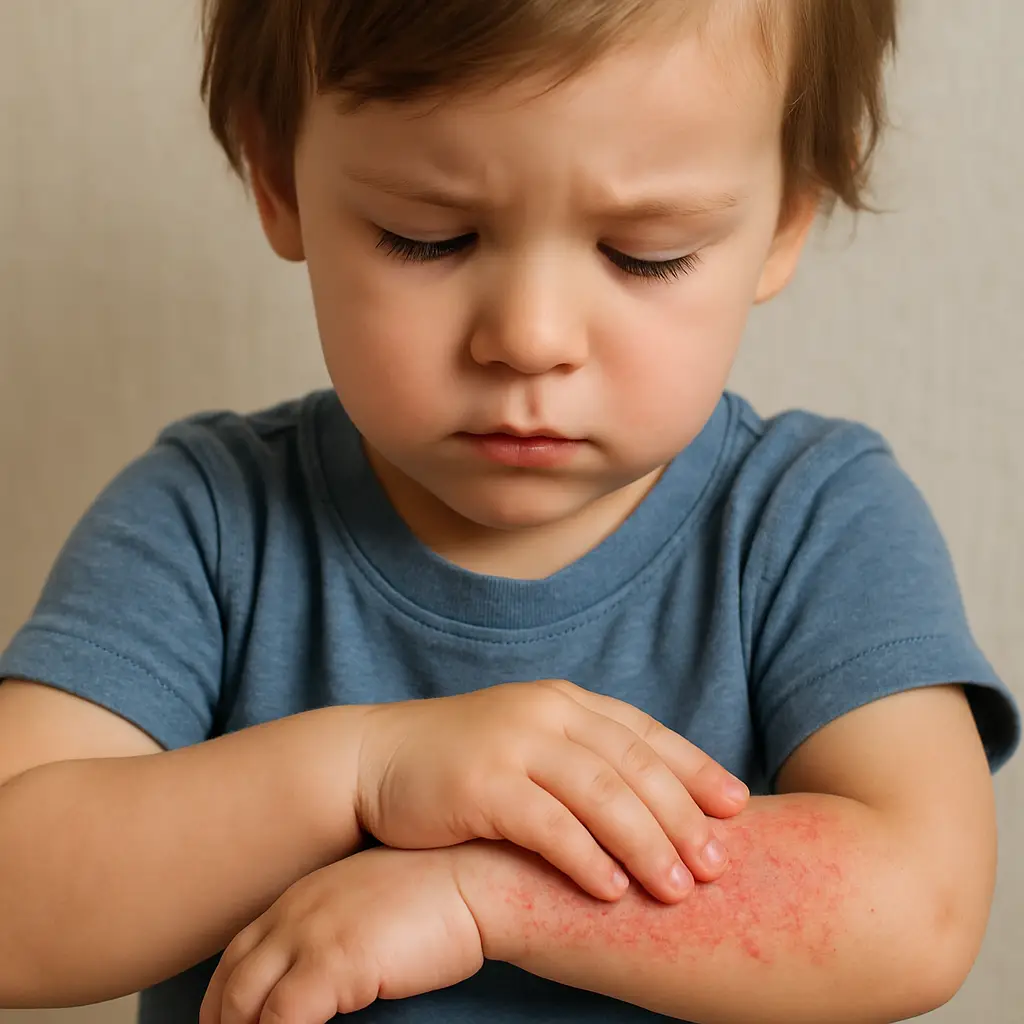
Triggers vary but typically include allergens, soaps, and stress. Awareness of these triggers helps in reducing flare-ups effectively.
Consult a pediatric dermatologist for tailored advice. They can assist in understanding and treating your child’s specific eczema needs.
Common Triggers and How to Avoid Them
Eczema flare-ups can be triggered by various factors. Understanding these triggers is vital for effective management. Avoiding them helps reduce the frequency and severity of flare-ups.
Common eczema triggers include:
- Allergens like pollen and dust
- Harsh soaps and detergents
- Stress and anxiety
- Abrupt changes in weather
- Certain food allergens
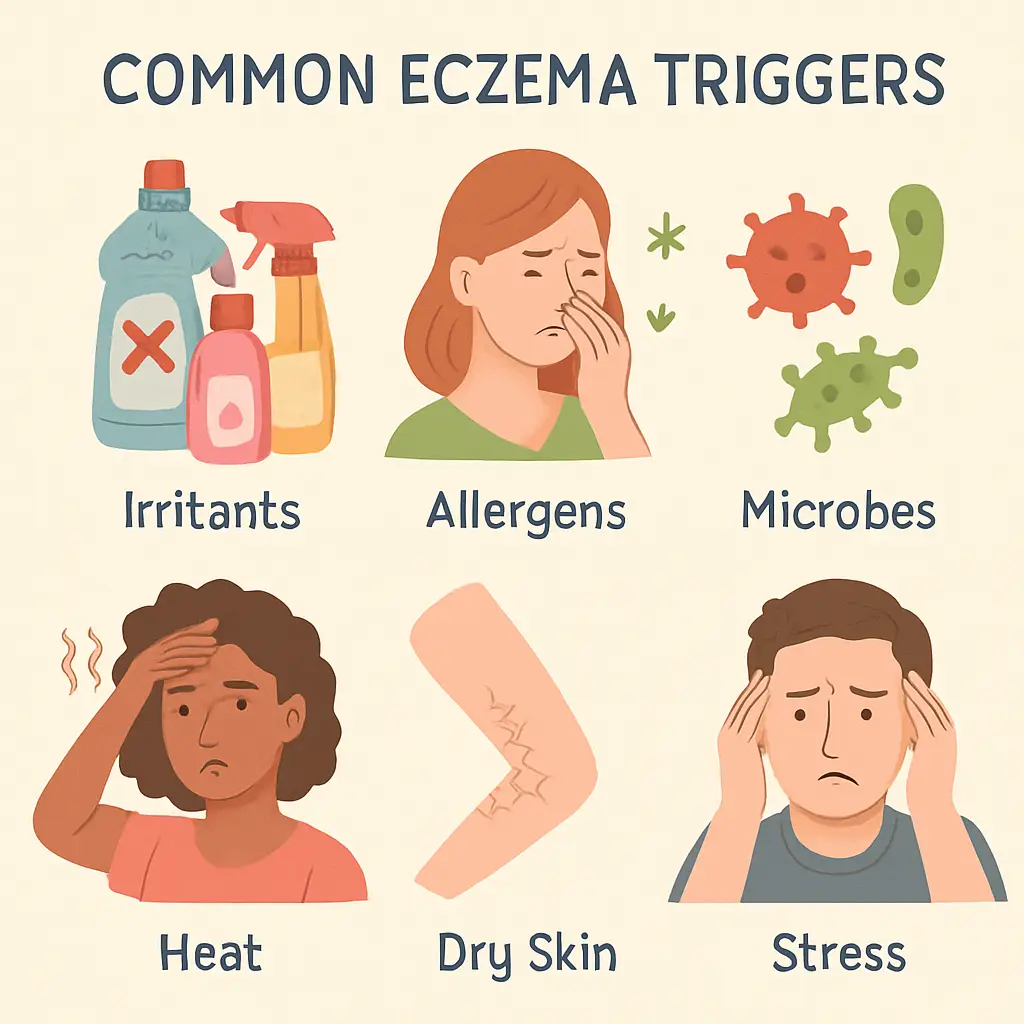
Recognizing specific triggers allows you to develop a personalized care plan. For instance, switching to fragrance-free detergents can be beneficial. Keeping the skin moisturized consistently is also crucial.
Stress can also aggravate eczema symptoms. Encouraging relaxation and mindfulness techniques helps manage stress levels. A stable and calming environment is often effective in reducing flare-ups.
Taking proactive steps can significantly improve your child’s skin health. Observing patterns and using a symptom diary may reveal additional individual triggers over time.
Daily Skincare Routines for Eczema-Prone Children
Establishing a consistent skincare routine is essential for managing childhood eczema. Use gentle and effective methods to keep your child’s skin healthy.
Choose a moisturizer that is both fragrance-free and hypoallergenic. Apply it immediately after bathing to lock in moisture. Opt for thick creams or ointments over lotions, as they tend to be more hydrating.
Consider the following daily skincare steps:
- Bathing in lukewarm water for 10-15 minutes
- Patting the skin dry with a soft towel
- Applying a rich moisturizer right away
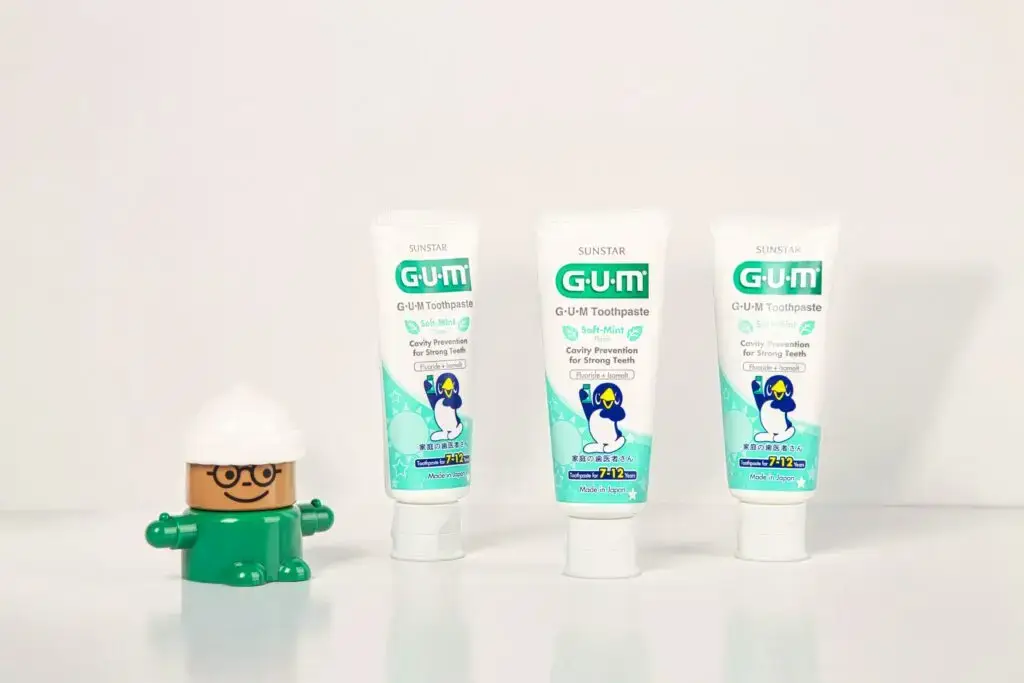
Natural oils can complement regular moisturizers. Coconut oil is particularly effective due to its antibacterial and anti-inflammatory properties. A few drops of it can be applied daily to soothe and moisturize.
For additional hydration, use wet wrap therapy. This involves applying wet bandages over moisturized skin to enhance absorption. This technique is particularly helpful during severe flare-ups.
Incorporate gentle cleansing practices. Opt for mild, unscented soaps and avoid bubble baths. Ensuring the skin remains clean yet well-moisturized is crucial for preventing irritation.
By integrating these daily routines, you can substantially reduce eczema flare-ups. Regular adjustments and monitoring can improve their efficacy as your child grows.
Natural Eczema Remedies for Young Skin
Exploring natural remedies can offer gentle relief for eczema-prone skin. These remedies often complement traditional treatments, offering a soothing touch.
Oatmeal baths are a simple yet effective remedy. Their anti-inflammatory properties help in calming itching and reducing redness. Simply add ground oatmeal to your child’s bath water.
Coconut oil is another excellent option. It acts as a natural moisturizer with antibacterial benefits, soothing inflamed skin and preventing infections.
Consider these natural remedies for added relief:
- Calendula cream for its soothing effects
- Aloe vera gel to provide a cooling sensation
- Honey for its natural antibacterial and moisturizing properties
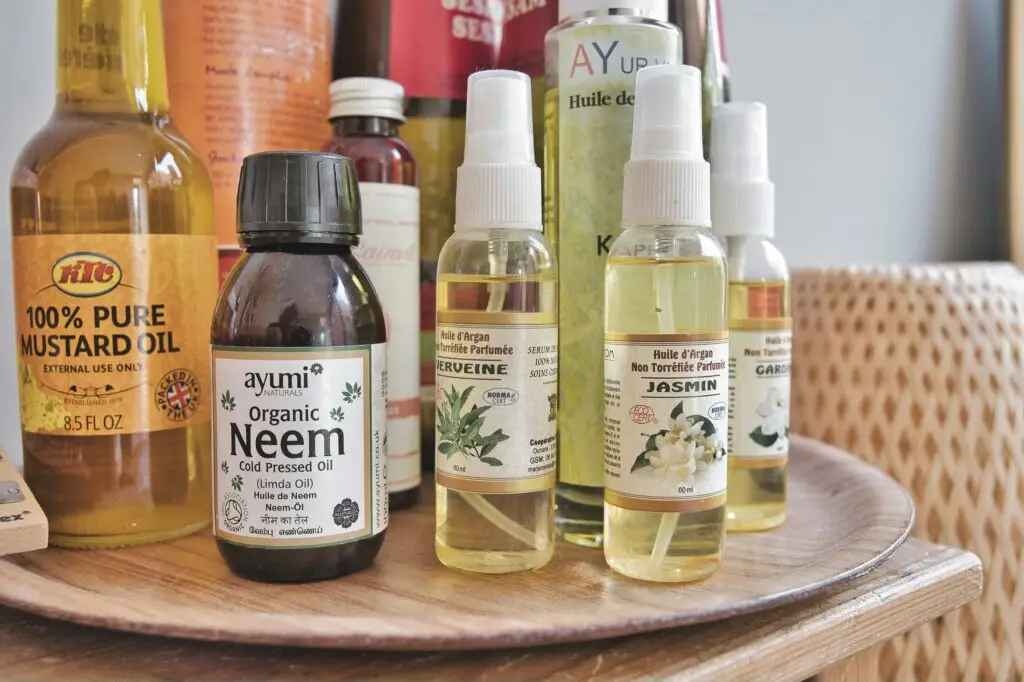
For some children, probiotics can help by improving gut health. This may reduce inflammation and, in turn, eczema symptoms. Consult your pediatrician before starting any supplements.
Utilize shea butter as a natural emollient. It helps lock in moisture and can be applied generously on affected areas. Shea butter’s nourishing properties make it ideal for daily use.
Dietary adjustments can also support skin health. Ensuring a balanced intake of omega-3 fatty acids may reduce inflammation. Incorporate fish, flaxseeds, or chia seeds into meals.
Always approach new treatments with care. Monitor any changes in your child’s skin condition. Combining these natural solutions with medical advice can create an effective eczema management plan.
Medical Treatments and When to Seek Help
Managing eczema sometimes requires medical intervention. While natural remedies offer relief, persistent symptoms may need a doctor’s touch.
Topical corticosteroids are common treatments prescribed to reduce inflammation. They are effective for severe eczema flare-ups but should be used as instructed by a healthcare provider.
Recognize when to seek professional help. If your child’s eczema worsens or shows signs of infection, such as increased redness or pus, timely medical advice is crucial.
Consider these situations to contact a healthcare professional:
- Symptoms not improving with home treatments
- Skin infections present
- Severe itching or discomfort affecting daily activities
For some children, non-steroidal topical medications like calcineurin inhibitors may be recommended. These can be used for sensitive areas like the face.
Oral antihistamines might be prescribed to manage severe itching, particularly at night. They can help improve sleep quality when itching is disruptive.
In some cases, the healthcare provider may suggest light therapy. This treatment is less common but can be effective when other strategies fail. Always consult a pediatric dermatologist to craft a personalized treatment plan for your child.
Lifestyle Tips for Managing Eczema Flare-Ups
Everyday habits play a crucial role in managing eczema. Simple changes can make a big difference in your child’s comfort.
Start with a gentle skincare routine. Daily moisturizing is essential to keep the skin hydrated and protected.
Encourage your child to drink plenty of water. Staying hydrated supports overall skin health and can reduce flare-ups.
Clothing choices matter too. Dressing your child in soft, cotton fabrics can help prevent skin irritation.
Here are some helpful lifestyle tips:
- Use mild, fragrance-free detergents for laundry.
- Place a humidifier in your child’s room to maintain moisture.
- Keep the child’s nails trimmed to prevent scratching.
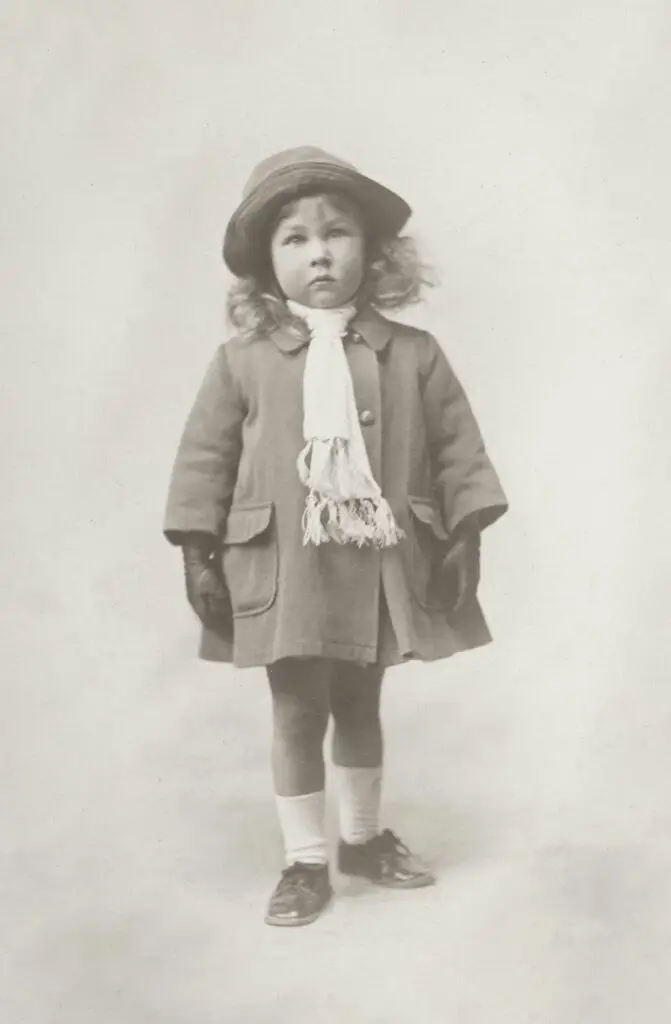
Teach children stress management techniques. Relaxation exercises, such as deep breathing or meditation, can reduce flare-up triggers.
Remember, consistency is key. Regularly review routines and adjust as needed. Keep an open line of communication with healthcare providers to ensure the best eczema management for your child. By embracing these lifestyle tips, you can help your child lead a more comfortable, itch-free life.
Supporting Your Child Emotionally and Socially
Managing eczema extends beyond the physical symptoms. It’s crucial to support your child emotionally and socially.
Children with eczema may feel self-conscious. Encourage open conversations about their feelings and experiences.
Help your child build confidence by focusing on their strengths and interests. This can provide positive distractions from their condition.
Here are some supportive strategies:
- Reassure your child that eczema is not contagious.
- Celebrate small victories in managing flare-ups.
- Involve them in planning their skincare routine.
Teach them to explain their condition to others if they choose. This empowerment can foster independence and improve social interactions.
Being part of a community matters. Connect with other families managing eczema for shared experiences and advice.
Your encouragement is vital. Create a supportive environment where your child feels understood and valued despite eczema challenges.
Frequently Asked Questions About Childhood Eczema Treatments
Parents often have questions when dealing with childhood eczema. Understanding the basics can ease anxiety and improve care.
One common question is how to identify eczema triggers. Watching for patterns or changes in your child’s routine can help pinpoint causes.
Here are answers to frequent queries:
- Can diet changes help? Yes, identifying food allergens can reduce flare-ups.
- When to consult a doctor? If home remedies aren’t effective, it’s time.
- Is eczema contagious? No, eczema cannot spread to others.
Understanding these aspects can lead to better management and help your child cope. The more informed you are, the more empowered you feel to help your child.
Conclusion: Embracing a Gentle, Holistic Approach
Managing childhood eczema requires patience, persistence, and empathy. Embracing a gentle approach prioritizes your child’s comfort and well-being.
Combining natural and medical remedies can offer the best results. Balancing these treatments with lifestyle changes supports long-term relief.
A holistic perspective nurtures physical health and emotional resilience. Your supportive role empowers your child to navigate eczema confidently.




